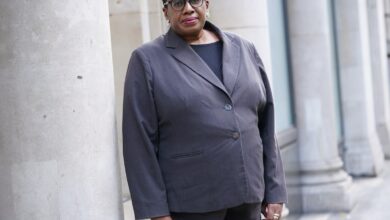Asylum seekers can be prosecuted for steering dinghies across the Channel, judge rules

Asylum seekers can be prosecuted for steering their own dinghies across the English Channel, a High Court judge has ruled.
Lawyers representing four men who were intercepted and brought to Dover in recent months argued that those being rescued at sea and claiming asylum on arrival have not committed an offence, and would have a defence under the Refugee Convention.
But Mr Justice Cavanagh ruled that new laws introduced by the government earlier this year could be used against the men and in a “significant number” of similar cases.
He said a widened offence of “arriving without entry clearance” applied to people who claim asylum immediately.
“The fact that the person is seeking asylum may have an effect on the prosecutorial decision as to whether it is in the public interest to prosecute, but that is a different matter,” the judge told Canterbury Court on Wednesday.
“If a person is granted asylum, they will obtain leave to enter and remain … but the fact remains that they were, at the time they arrived, a person who required entry clearance under the immigration rules.”
The ruling is being appealed as the government attempts to prosecute more asylum seekers for piloting small boats, despite mounting calls for safe and legal alternatives to the dangerous crossings.
It was issued days after the High Court ruled that the government’s plans to send asylum seekers who cross the Channel to Rwanda were lawful overall, but had not been legally applied to any of the individual cases considered.
The decisions to deport eight asylum seekers who challenged their cases were quashed and will be reconsidered by the Home Office, while the policy remains on hold pending potential appeals.
Lawyers representing the four Sudanese men challenging their prosecutions at Canterbury Crown Court launched an immediate appeal against Wednesday’s judgment, which is expected to be heard by the Court of Appeal in January.
Mr Justice Cavanagh granted permission to challenge his own ruling, saying he did not have doubts about his conclusions but there needed to be “clear rulings on points of law that are likely to arise time and again” in small boat cases.
“If I am wrong in my decisions on several of these points, then the result will be that many prosecutions cannot and should not proceed,” he added.
“It will plainly, in my judgment, be in the interests of all concerned, and in the public interest, for these issues to be heard and considered by the Court of Appeal as soon as possible.”
Canterbury Crown Court heard that since the Nationality and Borders Act came into force in June, around 78 people had been charged with the widened illegal entry offence.
It was told that the crime is primarily used against suspected boat pilots where the more serious offence of facilitating illegal entry cannot be proved.
Previously, several asylum seekers were wrongly jailed for steering boats because the original law did not apply to people intercepted at sea.
The court heard that Crown Prosecution Service (CPS) guidance for the new laws state that the Refugee Convention must be considered when deciding on charges, and that asylum seekers who do not steer boats and are not “egregious cases” in any other way are unlikely to be charged.
It says that small boat pilots who are “acting to safeguard” other passengers, or do not gain financially or otherwise from their role, may be charged with illegal entry rather than the more serious facilitation offence – which has a maximum sentence of life imprisonment.
Mr Justice Cavanagh said the guidance “gave effect” to the UK’s obligations under the Refugee Convention, and made clear that “it may be that those refugees, or presumptive refugees, who commit criminal offences as a necessary part of their journey to the UK are not prosecuted”.





